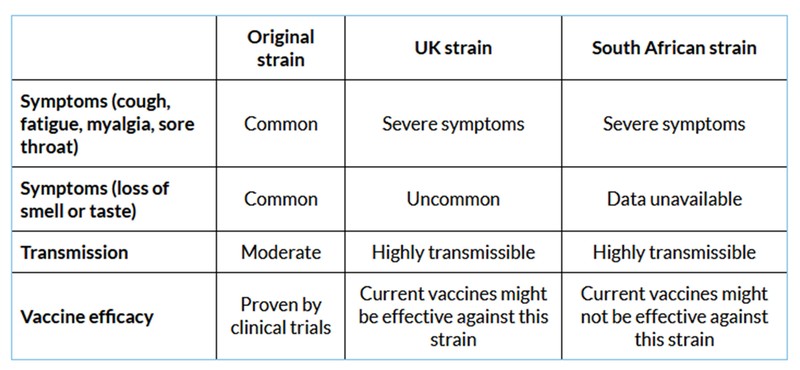COVID-19: Original vs new variants
M3 India Newsdesk Feb 19, 2021
According to the World Health Organisation (WHO), the definition of COVID-19 encompasses symptoms such as coryza, sore throat, vomiting and diarrhoea. With the emergence of the new variants, there is a need to understand the changes in symptoms, if any, of the newer variants for early diagnosis and management.
For our comprehensive coverage and latest updates on COVID-19 click here.
COVID-19, a disease caused by novel coronavirus, SARS-CoV-2 began in China and soon spread worldwide resulting in a pandemic. Following considerable research, vaccines were developed against the virus. Several countries have rolled out vaccination programs to control the infection. In the meantime, the virus underwent antigenic mutations and newer strains of the virus emerged.
The new variant detected in UK is known as B.1.1.7 or VUI 202012/01 and the one in South Africa is known as s 501Y.V2. The manifestation of COVID-19 infection ranges from asymptomatic carriers, mild symptoms such as cough, fever and fatigue to severe illness such as pneumonia or acute respiratory distress syndrome.
This article focuses on symptom differentiation among the variants.
UK variant
Found to be 40-70% more transmissible compared to the older variant, the UK variant is also probably more deadly, though there is not enough data to prove this yet. The symptoms seen with this variant are cough, sore throat, fatigue, or myalgia. A loss of smell or taste which was a common symptom in the older variant is not seen in this new variant which emerged in UK. Other clinical features such as gastrointestinal symptoms, dyspnoea and headache are similar in both older and newer variant of the disease.
The new UK variant presents with more symptoms of upper respiratory tract infection such as cough and sneezing. It has been postulated that these symptoms result in more virus shedding leading to an increase in disease transmission making it more infectious. Since the new strain is more infectious, more number of healthcare workers are being tested positive for the disease compared to the earlier period of the older strain.
The diagnosis of COVID-19 is done on the basis of the detection of the viral genes in the nasopharyngeal swabs. Presence of one or more of the genes, namely N protein, S protein and ORF1ab indicate a positive result. In the newer UK variant, the S protein is not detected due to genetic changes in the S-gene. There are some unpublished reports implicating a higher death rate with the new UK variant; however this needs to be conclusively established with more data.
Vaccine efficacy
Experts have indicated that the current vaccines might be effective against the new UK variants. This is due to the fact that vaccination or natural infection produces wide range of antibody responses and therefore, though the mutations in the new variants may render some sites unrecognisable by the antibodies, they may not affect the remaining recognisable antigens of the virus. However, more research is underway to establish the same.
South African variant
At the time that the new UK variant emerged, a new variant was reported from South Africa. This variant is also more transmissible with a higher viral load. This variant has 9 mutations in the spike protein of the virus.
Vaccine efficacy
Researchers have speculated that the current vaccines may not be effective against the South African variant because of mutations in the receptor binding domain of the spike protein. This is the region targeted by the antibodies which may fail to recognise the mutated proteins. The vaccines have a lower level of neutralising titres against the South African variant, resulting in lowered immunity. There is also an increased risk of re-infection with the new South African strain.
Original COVID-19 strain vs new variants
The table presented below gives a comparative analysis between the original COVID-19 strain and the newly emerged strains:

Brazilian strain
In early January this year, a strain called B.1.1.28.1 or P.1 was identified among a few travellers from Brazil. The strain also carries the E484K mutation common to the UK and South African variants, rendering it more contagious. Nevertheless, there is minimal data available on whether it is capable of causing serious illness or mortality.
Vaccine efficacy
The E484K mutation can dodge immune defences and evade vaccine-induced immunity. This finding has resulted in studies expressing concern over efficacy. Vaccine makers have announced that additional efforts will be taken to come up with a booster shot or an updated version that will be efffective at neutralising the strains.
Persistence of symptoms with new variants
Some patients affected with COVID-19 had “long covid” since they continued to complain of symptoms such as of fatigue, dyspnoea, joint pain and chest pain even after recovery. It is still premature to predict similar persistence of symptoms with the new variants. It is also being feared that children might be affected more with the newer strains; however there is no conclusive evidence to prove this.
To combat the newly emerged strains of the virus, researchers have suggested booster doses of the vaccine which would be effective against the UK and South African variants. There is a lot of uncertainty regarding the presenting symptoms, severity, long term effects and vaccine efficacy of the newer strains of the virus which requires relentless research to accumulate more data.
Current status in India
The Indian Council of Medical Research (ICMR) reported on February 16 that it has found a total of 192 cases involving infection by the variants in the past two months, which include 4 of the South African variant and 1 of the Brazilian. ICMR has mentioned that no mortality has been reported as yet.
-
Exclusive Write-ups & Webinars by KOLs
-
Daily Quiz by specialty
-
Paid Market Research Surveys
-
Case discussions, News & Journals' summaries